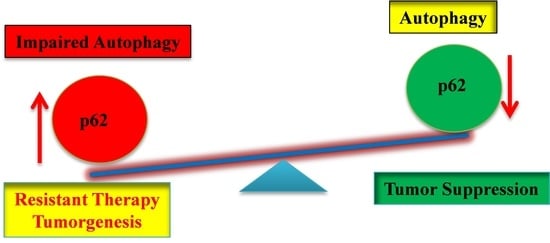Autophagic Regulation of p62 is Critical for Cancer Therapy
Abstract
Share and Cite
Islam, M.A.; Sooro, M.A.; Zhang, P. Autophagic Regulation of p62 is Critical for Cancer Therapy. Int. J. Mol. Sci. 2018, 19, 1405. https://doi.org/10.3390/ijms19051405
Islam MA, Sooro MA, Zhang P. Autophagic Regulation of p62 is Critical for Cancer Therapy. International Journal of Molecular Sciences. 2018; 19(5):1405. https://doi.org/10.3390/ijms19051405
Chicago/Turabian StyleIslam, Md. Ariful, Mopa Alina Sooro, and Pinghu Zhang. 2018. "Autophagic Regulation of p62 is Critical for Cancer Therapy" International Journal of Molecular Sciences 19, no. 5: 1405. https://doi.org/10.3390/ijms19051405
APA StyleIslam, M. A., Sooro, M. A., & Zhang, P. (2018). Autophagic Regulation of p62 is Critical for Cancer Therapy. International Journal of Molecular Sciences, 19(5), 1405. https://doi.org/10.3390/ijms19051405





